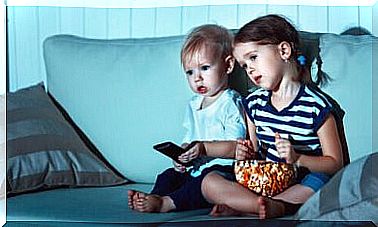Why Is It Important To Be Reconciled In Front Of Children? – Being Parents

In our daily life, we often go forward with autopilot on and we forget that when we become parents a pair of eyes observe everything we do and integrate it internally. Find out why it is important to be reconciled in front of children.
Thus, disputes take place in all families between parents, and children witness and suffer. However, even if the latter always end up reconciling, the little ones are generally not present during this happy ending.
It is true that, the next day, they can see that the dynamics of their reference adults have returned to normal. They see again how their parents address each other lovingly and without difficulty. However, as with their presence in the face of argument, it is important that we show them conflict resolution. Let’s see why.
How do arguments affect children?
For a child, his parents are his two main attachment figures. He trusts them to bring him love and basic needs, but also structure, security and guidance.
It is always important that parents function as a team in front of their children because it shows them a solidity that inspires them with confidence and peace of mind.

Thus, when parents argue and children are present, the latter suffer, especially when they do not see the respect, assertiveness and tenderness appear which should always dominate the interactions, in spite of the disagreement.
Seeing the two most important people in their world angry with each other, screaming or disrespecting each other really affects the child.
- He is scared because the two people in charge of his safety and well-being seem disturbed, angry and out of control. The child probably doesn’t know why this argument broke out, or how it will end. This uncertainty can arouse great anxiety in him.
- He feels guilty because the child often feels responsible for the discomfort of his parents and their argument. He may feel like they are angry because he behaved badly or because he did something bad.
- The child acquires inadequate strategies for social interaction. Children learn by imitation; through what they observe, they create a picture of how human relationships work and internalize certain patterns of behavior. So your child can normalize yelling, name calling, or indifference as valid communication tools.
It is not always possible to avoid conflict
Obviously, arguing in front of our children is not good. It is always best to find times when we are alone so that we can discuss and resolve our disagreements without the children being present.
Likewise, if we are to speak about something in front of them, we must do so carefully and in a good conscience. We cannot get carried away by our impulses and we must try to communicate in the most respectful and assertive way possible.
Even so, we parents are human beings too. We are not machines or robots: we cannot always control everything.
On the other hand, conflicts and setbacks are unplanned things and can sometimes arise at inappropriate times. This unpleasant situation has already occurred in all families.

The importance of being reconciled in front of children
There is no need to blame us if we let our children witness an argument. On the other hand, it is essential to come to terms with them and allow them to learn from this experience.
Most of the time, this happens when children are already asleep or when they are playing in a different room. However, if we allow them to be present, it will be very beneficial to them.
At first, they will be calmer when they see that their two reference figures get along again. In addition, we teach them (by example) that it is normal for conflicts and disagreements to arise, but that these do not imply a lack of love or the end of the relationship.
We show them how to deal with disagreements and resolve conflicts with other people. But, above all, we allow them to witness acts as important as the humility to ask forgiveness, the nobility to accept the apologies and displays of affection proper to reconciliation.
Therefore, if we could not prevent the child from witnessing the argument, reconciling in front of him will always be a great alternative.









